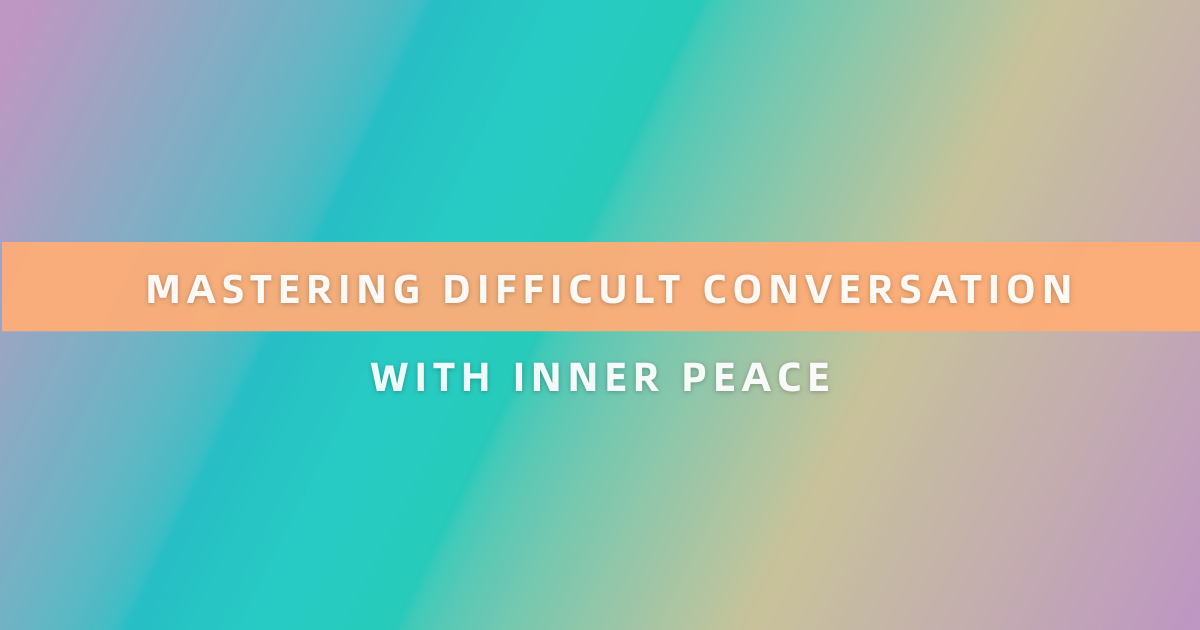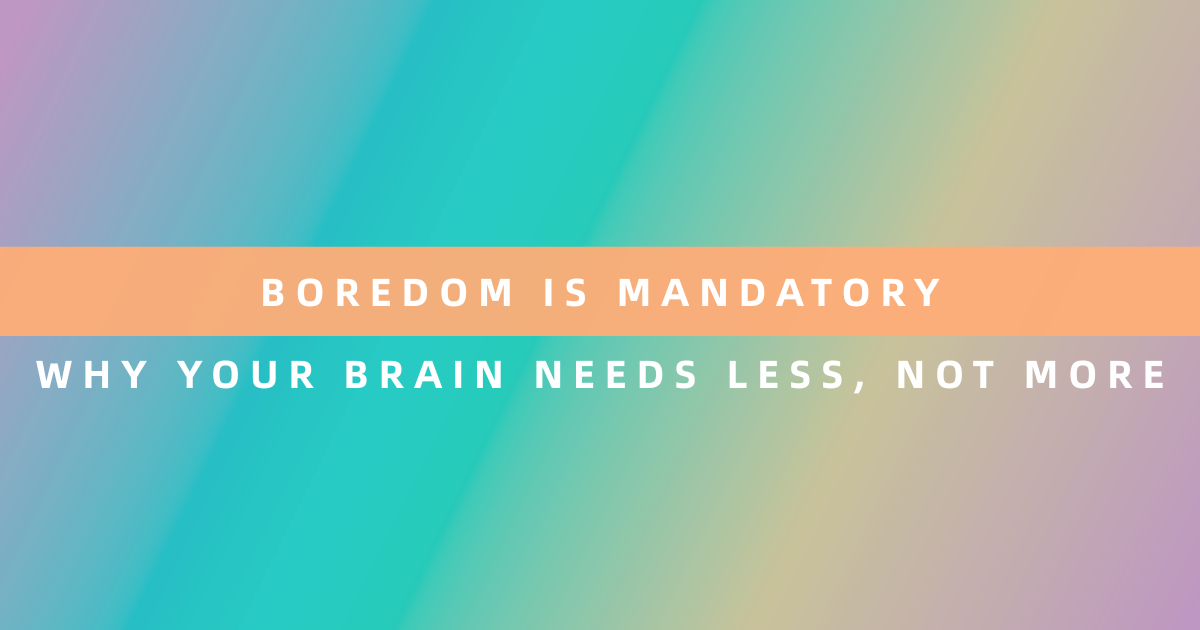Your heart pounds as you rehearse the words for the hundredth time. Whether it’s asking for a raise, setting boundaries with family, addressing relationship concerns, or confronting a friend’s hurtful behavior, the conversation ahead feels like an emotional minefield. You’ve lost sleep imagining worst-case scenarios, and your stomach churns at the thought of potential conflict.
Sound familiar? Most people would rather endure ongoing frustration than initiate difficult conversations, choosing silent suffering over momentary discomfort. Yet these unspoken truths poison relationships, erode self-worth, and create chronic stress that impacts every area of life.
The Psychology Behind Conversation Anxiety
Difficult conversations trigger our most fundamental, deeply ingrained evolutionary programming. The brain perceives potential conflict as a threat, activating the same fight-or-flight response that our ancestors needed for physical survival. In modern times, this means a racing heart, sweaty palms, and clouded thinking when we need clarity most.
Several factors intensify conversation anxiety:
Fear of Rejection: Humans are wired for connection. The possibility of damaging relationships or facing rejection activates primal fears of abandonment. This fear often keeps people silent even when speaking up would strengthen relationships long term.
Conflict Avoidance Programming: Many people grow up in environments where conflict meant danger, teaching them to prioritize peacekeeping over truth-telling. These early patterns create adults who struggle to advocate for themselves or address problems directly.
Perfectionism Paralysis The desire to handle conversations perfectly prevents many from starting them at all. Waiting for the “right” words, timing, or emotional state becomes an endless postponement strategy.
Catastrophic Thinking Anxiety amplifies worst-case scenarios. A simple request for behavioral change becomes imagined relationship destruction. A workplace concern transforms into job loss fears. These mental spirals make conversations feel more dangerous than they actually are.
Understanding these psychological barriers helps normalize the discomfort while revealing why mastering difficult conversations is essential for mental health and authentic relationships.
The True Cost of Avoidance
While avoiding difficult conversations feels safer in the moment, the long-term costs to mental health and relationships prove devastating:
Internal Consequences:
- – Chronic stress from unresolved issues
- – Resentment that poisons daily interactions
- – Decreased self-esteem from not advocating for needs
- – Anxiety that compounds with each avoided conversation
- – Physical symptoms like insomnia, headaches, and digestive issues
Relationship Damage:
- – Growing distance as authenticity decreases
- – Passive-aggressive behaviors replacing direct communication
- – Misunderstandings that could be easily clarified
- – Lost opportunities for deeper connection
- – Eventual relationship breakdown from accumulated grievances
Professional Impact:
- – Stagnant careers from not negotiating or speaking up
- – Workplace stress from unaddressed conflicts
- – Missed opportunities for growth and advancement
- – Reputation damage from indirect communication styles
The energy spent avoiding one conversation often exceeds what the actual discussion would require. Meanwhile, problems compound, making eventual conversations even more difficult.
Building Your Conversation Foundation
Mastering difficult conversations starts long before the actual discussion. Inner peace during challenging dialogues comes from solid preparation and self-awareness:
Emotional Preparation
Know Your Why Clarity about your conversation’s purpose anchors you during emotional moments. Ask yourself:
- – What specific outcome do I seek?
- – How will this conversation serve the relationship?
- – What values am I honoring by speaking up?
- – What becomes possible if this goes well?
Process Your Emotions First. Platforms like Theryo offer valuable space for pre-conversation processing. Using AI-guided journaling to explore your feelings helps separate emotional reactions from core messages. When you’ve already processed anger, hurt, or fear privately, you can approach conversations from a calmer place.
Practice Self-Compassion Difficult conversations require courage. Acknowledge this bravery rather than criticizing yourself for feeling nervous. Self-compassion creates the internal safety needed for external vulnerability.
Practical Preparation
Script Key Points: While conversations should flow naturally, preparing core messages prevents emotional hijacking. Write down:
- – Your main concern or request
- – Specific examples without blame
- – Your desired outcome
- – Potential compromises you’d accept
Choose Time and Setting Wisely. Environment impacts conversation success:
- – Private spaces reduce defensiveness
- – Neutral territories feel less threatening
- – Adequate time prevents rushing
- – Minimal distractions allow focus
Prepare for Various Responses. Imagining different reactions reduces surprise and helps maintain composure:
- – Best case acceptance and understanding
- – Defensive or angry responses
- – Deflection or blame shifting
- – Requests for time to process
Conversation Techniques That Preserve Peace
During the actual conversation, specific techniques help maintain both effectiveness and inner calm:
The Opening Sets the Tone
Start with connection and clarity:
- “I value our relationship and want to discuss something important.”
- “I’ve been struggling with how to bring this up because I care about you.”
- “There’s something on my mind that I think would help us both.”
These openings signal care while preparing for serious discussion.
Use “I” Statements
Transform accusations into personal experiences:
- Instead of: “You never listen to me”
- Try: “I feel unheard when I share my concerns.”
This approach reduces defensiveness while maintaining truth.
Listen with Genuine Curiosity
Many difficult conversations fail because both parties focus on being heard rather than understanding. Practice:
- – Reflecting what you hear
- – Asking clarifying questions
- – Acknowledging emotions, even if you disagree with positions
- – Finding nuggets of truth in their perspective
Manage Emotional Flooding
When emotions surge during conversations:
- – Take slow, deep breaths
- – Request brief pauses if needed
- – Ground yourself by feeling your feet on the floor
- – Remember your core intention
- – Use Theryo’s coping strategies you’ve practiced
Know When to Pause
Not every conversation needs immediate resolution. Recognize when to say:
- “This is important. Can we take time to think and continue tomorrow?”
- “I need to process what you’ve shared before responding.”
- “Let’s both reflect and reconnect when emotions are less high.”
Post Conversation Self-Care
Protecting inner peace extends beyond the conversation itself:
Immediate Aftermath
Release Physical Tension. Difficult conversations create body stress. Immediately after:
- – Take a walk to discharge nervous energy
- – Practice progressive muscle relaxation
- – Use breathing exercises to calm your system
- – Stretch areas where you hold tension
Process Without Ruminating. There’s a difference between healthy processing and destructive rumination:
- – Journal about what went well
- – Acknowledge your courage
- – Note any insights gained
- – Identify next steps if needed
Theryo’s AI-powered journaling excels here, helping distinguish productive reflection from anxiety spirals.
Ongoing Integration
Manage Your Expectations. Change takes time. One conversation rarely resolves everything. Focus on:
- – Progress over perfection
- – Planting seeds versus immediate harvest
- – Relationship trajectory rather than single interactions
- – Your own growth through the process
Maintain Boundaries. After setting boundaries through difficult conversations:
- – Consistently uphold them with compassion
- – Expect testing behaviors initially
- – Remind yourself why boundaries matter
- – Seek support when wavering
Common Conversation Scenarios
Different types of difficult conversations require tailored approaches:
Workplace Discussions
Asking for Raises or Promotions:
- – Document achievements beforehand
- – Research market rates
- – Frame requests around the value provided
- – Prepare for negotiation
Addressing Conflict with Colleagues:
- – Focus on work impact, not personalities
- – Suggest solutions, not just problems
- – Involve HR when appropriate
- – Document important conversations
Family Conversations
Setting Boundaries with Parents:
- – Acknowledge generational differences
- – Express love while maintaining limits
- – Expect emotional responses
- – Stay consistent despite guilt
Addressing Partner Concerns:
- – Choose calm moments, not heated ones
- – Focus on specific behaviors, not character
- – Share impact without blame
- – Create space for their perspective
Friendship Challenges
Confronting Hurtful Behavior:
- Assume positive intent initially
- Share specific examples
- Express your needs clearly
- Be prepared for various outcomes
When Professional Support Helps
Some conversations benefit from professional guidance:
- – High stakes discussions with significant consequences
- – Patterns of failed attempts at communication
- – Trauma-related conversation anxiety
- – Family systems requiring mediation
Therapists help process emotions, practice conversations, and develop personalized strategies. Platforms like Theryo bridge therapy sessions by providing daily support for building communication skills and processing conversation-related anxiety.
Your Communication Transformation
Mastering difficult conversations while protecting inner peace is a learnable skill that transforms every life area. Start with one conversation you’ve been avoiding. Use the preparation techniques outlined here. Practice self-compassion throughout the process. Remember that courage isn’t the absence of fear but acting despite it.
Consider using Theryo’s AI-powered platform to support your journey. The journaling features help process pre-conversation anxiety and post-conversation insights. Mood tracking reveals how addressing difficult topics impacts overall well-being. Most importantly, the collaborative features allow sharing relevant insights with therapists who can provide personalized guidance.
Every difficult conversation navigated successfully builds confidence for the next one. Each boundary set with love strengthens self-worth. Every truth spoken with compassion deepens relationships. Your inner peace doesn’t require avoiding all conflict, but rather moving through necessary conversations with skill and self-care.
The conversation you’re avoiding might be the doorway to the relationship, career, or self-respect you’re seeking. Take a deep breath, prepare with intention, and trust your ability to handle whatever comes. Your future self will thank you for the courage you show today.
Frequently Asked Questions
Q: How do I know when a conversation is necessary versus when I should let something go?
If an issue repeatedly occupies your thoughts, impacts your daily well-being, or affects your ability to be authentic in relationships, a conversation is likely needed. Minor annoyances that don’t significantly impact you can often be released. Trust your intuition about what genuinely needs addressing.
Q: What if the other person refuses to engage in the conversation?
You can’t control others’ willingness to communicate, but you can express your needs clearly and set boundaries based on their response. State your position calmly, give them time to process, and decide how to proceed based on their actions rather than forcing immediate discussion.
Q: How can I stay calm when the other person becomes angry or defensive?
Prepare calming techniques beforehand: deep breathing, grounding exercises, or meaningful phrases. Remember that their emotional reaction often stems from their own pain or fear. Stay focused on your intention, speak slowly, and don’t match their energy level. It’s okay to pause the conversation if emotions escalate beyond productive levels.
Q: Should I have difficult conversations in person, over the phone, or in writing?
In-person conversations allow for full communication, including body language and immediate clarification. Phone works for distance or when face-to-face feels too intense. Written communication provides thinking time but risks misinterpretation. Choose based on the relationship, topic sensitivity, and what allows you to communicate most clearly.
Q: How do I handle difficult conversations with someone who has more power, like a boss or parent?
Acknowledge the power dynamic while maintaining self-respect. Focus on facts and impact rather than emotions. Use collaborative language like “How can we work together to solve this?” Document important conversations. Remember that speaking truth respectfully is powerful regardless of hierarchy.
Q: What if I cry or get emotional during the conversation?
Emotions are natural during meaningful conversations. Brief tears or visible emotion often deepen connection and show sincerity. If overwhelmed, say, “I need a moment because this matters to me.” Take breaths, gather yourself, and continue. Don’t let fear of emotion prevent important conversations.
Q: How can technology like Theryo help with difficult conversations?
Theryo’s AI-powered journaling helps process emotions before conversations, preventing emotional dumping. The mood tracking features reveal patterns around communication anxiety. Session notes can capture insights from therapy about communication skills. The platform bridges therapy sessions with daily practice of conversation skills.
Q: What if the conversation makes things worse?
Sometimes relationships need to be destabilized before finding a new balance. Short-term discomfort doesn’t mean failure. Evaluate based on long-term trajectory rather than immediate reactions. If truly destructive patterns emerge, seek professional support to navigate the situation.
Q: How do I rebuild trust after a difficult conversation damages a relationship?
Consistently follow through on any commitments made during the conversation. Give the relationship time to heal while maintaining respectful boundaries. Acknowledge the courage it took for both parties to engage. Focus on small positive interactions to slowly rebuild the connection.
Q: When should I involve a mediator or therapist in difficult conversations?
Consider professional help when conversations repeatedly fail, involve abuse or safety concerns, address deep trauma, or when both parties want resolution but can’t achieve it alone. Therapists provide neutral ground and communication tools that transform stuck patterns.
Q: How can I prepare for unexpected difficult conversations I didn’t initiate?
Develop general skills through regular practice with planned conversations. Maintain ongoing self-care so you’re emotionally resourced. Have default responses ready, like “This is important. Can I take time to think before responding fully?” Remember, you can set boundaries even in conversations you didn’t start.
Q: What’s the difference between being assertive and being aggressive in conversations?
Assertiveness respects both your needs and others’ dignity. It uses “I” statements, maintains a calm tone, and seeks mutual solutions. Aggression attacks, blames, or dominates. Assertiveness says, “I need this boundary.” Aggression says, “You’re wrong for crossing it.” Focus on expressing needs without diminishing others.







